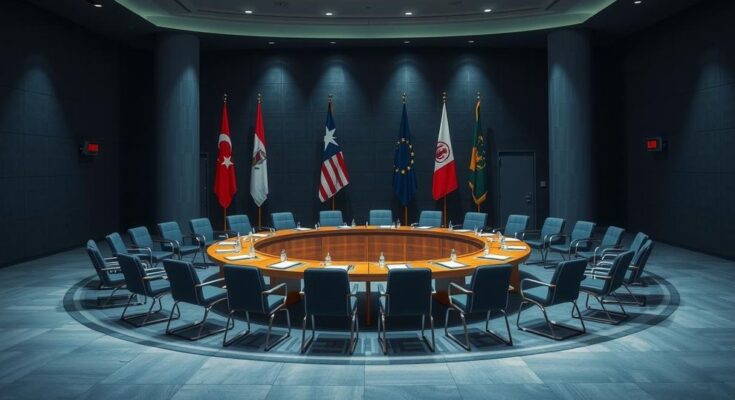The UN Security Council will convene to discuss Iran’s rising uranium stockpile. Key concerns include Iran’s compliance with the IAEA regarding undeclared nuclear materials. Western nations argue there is no need for high-level enrichment for civilian purposes while the potential reinstatement of international sanctions via snapback mechanisms is being considered. Tensions escalate as the US issues an ultimatum to Iran amidst ongoing diplomatic discussions.
The United Nations Security Council plans to hold a closed-door meeting regarding Iran’s increasing stockpile of uranium enriched to near weapons-grade levels. This assembly was requested by six members: France, Greece, Panama, South Korea, the United Kingdom, and the United States, focusing on Iran’s adherence to International Atomic Energy Agency (IAEA) obligations regarding undeclared nuclear materials found at various sites in Iran.
Western nations assert that there is no legitimate civilian requirement for Iran to enrich uranium to such high levels and emphasize that no other country has enriched to this extent without pursuing nuclear weapons. Conversely, Iran maintains that its nuclear program serves peaceful purposes only.
The UK, France, and Germany have expressed readiness to activate the “snapback” mechanism to reinstate international sanctions on Iran to prevent its acquisition of nuclear weapon capabilities. However, their opportunity to act is limited as the 2015 UN resolution related to the Iran nuclear deal will expire on October 18 of this year. This mechanism allows reinstatement of sanctions if Iran does not fulfill its commitments under the Joint Comprehensive Plan of Action (JCPOA). With the US withdrawal from the JCPOA in 2018, only the remaining European signatories can exercise snapback before the resolution’s total expiration in October 2025.
Amid escalating tensions, US President Donald Trump has reportedly communicated with Iran’s Supreme Leader, Ali Khamenei, presenting two choices: eliminate nuclear activities and military concerns or face military action targeting its nuclear infrastructure. Khamenei responded by stating that Iran would not negotiate under pressure, especially since Western demands have expanded to include limiting Iran’s regional influence and missile programs.
Despite this, Russia indicated that Iran may be willing to limit its nuclear activities in return for sanctions relief. Iran’s delegation to the UN suggested openness to nuclear negotiations due to heightened US military action threats, while Foreign Minister Abbas Araghchi confirmed ongoing talks with European nations to enhance trust. This suggests Iran is attempting to exploit existing rifts between the US and its European allies to reduce coordinated international pressure.
In summary, the UN Security Council’s upcoming meeting addresses Iran’s expanding uranium enrichment, raising concerns among Western nations regarding compliance with the IAEA. The potential for reinstating sanctions via the snapback mechanism is contingent on timing and commitment from European states. Furthermore, the discourse between the US and Iran is characterized by constraints and openness, as each party navigates complex diplomatic channels amid calls for nuclear negotiations.
Original Source: irannewsupdate.com




